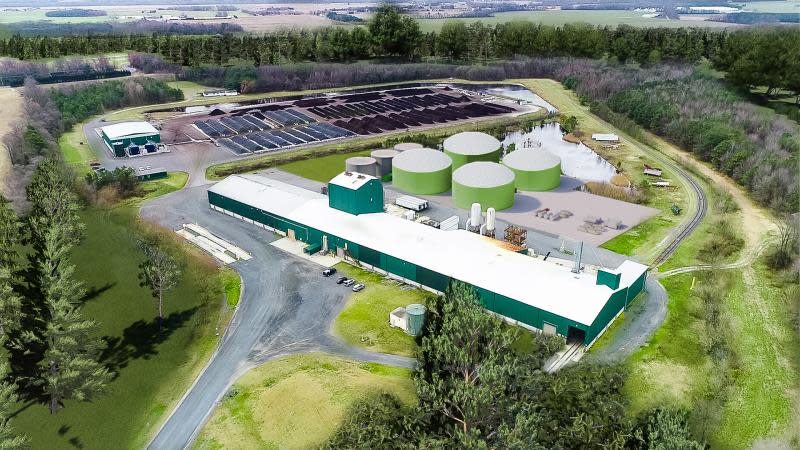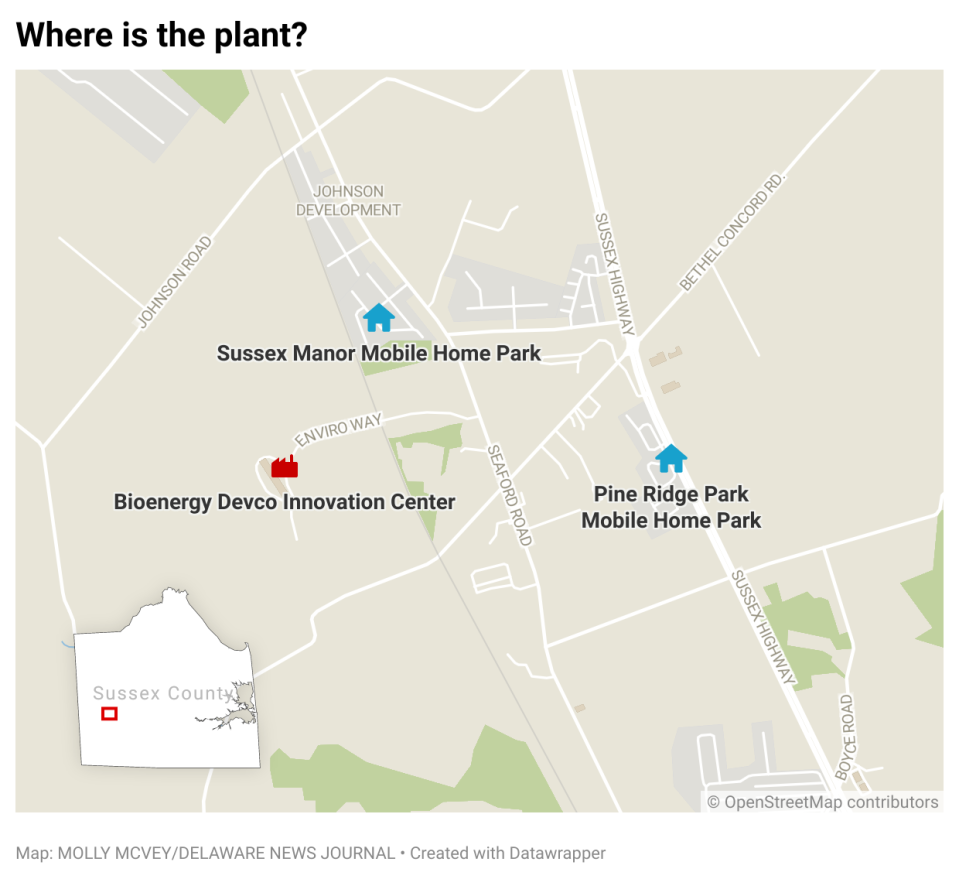Biogas plant in Seaford gets OK from state. Is it a good thing?

A project being protested by environmental groups for years has been given the green light by the Delaware Department of Natural Resources and Environmental Control.
The department’s issuance of five new waste and air quality permits will allow Bioenergy Devco in Seaford to construct an anaerobic digestion system and a biogas plant. The facility already houses a poultry waste composting operation.
Once the project is complete, Bioenergy Devco will process an expected 250,000 tons of poultry waste annually, according to the Department of Natural Resources. It's “expected to lessen the nutrient burden on local watersheds, helping to reduce pollution and nutrient runoff within Delaware and the Chesapeake Bay(s),” according to a news release from the department.
U.S. Sen. Tom Carper’s office also issued a statement in support of the project.
"As Chairman of the U.S. Senate Environment and Public Works Committee, Senator Carper has long supported the creation of a facility that uses anaerobic digestion to recycle poultry waste," the statement said.
However, nonprofit Food & Water Watch has a different perspective. They claim biogas incentivizes factory farming and that Bioenergy Devco in Seaford, specifically, has an environmental justice problem.
What's being permitted in Seaford
Anaerobic digestion systems, like the one to be built in Seaford, use bacteria to break down organic matter (in this case, poultry waste) in the absence of oxygen, according to the U.S. Environmental Protection Agency.
Bioenergy Devco, along with its European arm, BTS Biogas, has built over 250 anaerobic digesters and manages 140 of them, according to the company's website.
Background: Civil rights complaint against DNREC, Sussex County targets Seaford-area gas plant approval
The biogas the anaerobic digester will produce is composed mainly of methane, according to the EPA. The gas will be trucked to Chesapeake Utilities pipelines, where it will provide power for Sussex County utility customers.
Like many fuels, biogas is flammable and can be explosive.
"The safety of our employees and the community is our number one priority," said Bioenergy Devco spokesperson Jessica Whidt. "In addition to our excellent safety record, the State Fire Marshal has approved the Fire Protection Plan, and members of Seaford and Blades fire companies have visited our site and expressed confidence in our safety measures and emergency plans."
Why some groups are opposed
Nonprofit Food & Water Watch has been speaking out against the project since 2020, when Bioenergy Devco was seeking a permit from Sussex County. In January 2022, they were one of 35 groups to sign a letter to Gov. John Carney asking him to oppose “all buildout of biogas infrastructure.”

They cite truck traffic and the danger of gas-carrying trucks. There are air and water quality issues for the community surrounding the plant, according to Food & Water Watch, and an environmental justice factor.
“The community surrounding Bioenergy DevCo’s proposed biogas facility is home to people of color at almost twice the rate of Sussex County as a whole and home to people living in poverty at almost three times the rate of Sussex County as a whole,” a Food & Water Watch news release said.
Earlier this year, ACLU Delaware and other organizations filed a complaint with the Environmental Protection Agency claiming both Sussex County and the Department of Natural Resources violated the Civil Rights Act in Bioenergy Devco's permitting process, mainly by failing to provide information in languages other than English and to people without access to technology. The complaint is still under review.
The department’s news release said the permitting process “included a significant amount of outreach to and from the community."
Background: Sussex approves Bridgeville natural gas project despite opposition from environmental groups
Food & Water Watch Attorney Tyler Lobdell believes the decision to issue the permits was ultimately Governor Carney’s, and said it was a “dereliction of his duty.”
"(DNREC) Secretary Garvin is appointed by the governor and serves at the pleasure of the governor, and it’s Governor Carney’s responsibility ultimately to decide if and how the state addresses climate change including whether or not to permit (Bioenergy Devco)," Lobdell said.
Is biogas good or bad for the environment? It’s complicated.
The crux of Food & Water Watch’s argument is that biogas is “greenwashing.” Mining gas from poultry waste, according to former Delaware Organizer Greg Layton, “props up the factory farm system on Delmarva, which is one of our largest polluters.”
Opinion: This why Bioenergy Devco's gas project Is all wrong for Delaware
According to the World Wildlife Federation, biogas is good in that it dramatically reduces the climate impact of methane, prevents water pollution and is much more sustainable than some other ways of harvesting natural gas, such as fracking. Biogas is especially beneficial, according to the federation's Tim Juliani and Pete Pearson, in industrial processing.
The processes to make many things society demands, such as food, steel and cement, “require extremely high heat that currently only gas can provide,” Juliani and Pearson wrote. “Since this sector will likely require the use of natural gas for years to come, biogas can be part of the solution.”
However, burning biogas still has climate impact, they wrote, and should be used only as a temporary solution. Ultimately, the best thing for the environment is to use truly "clean" energy without carbon dioxide emissions, such as solar power, hydropower and wind energy.
Shannon Marvel McNaught reports on Sussex County and beyond. Reach her at smcnaught@gannett.com or on Twitter @MarvelMcNaught
This article originally appeared on Delaware News Journal: Biogas coming to Seaford, but is it good for the environment?

